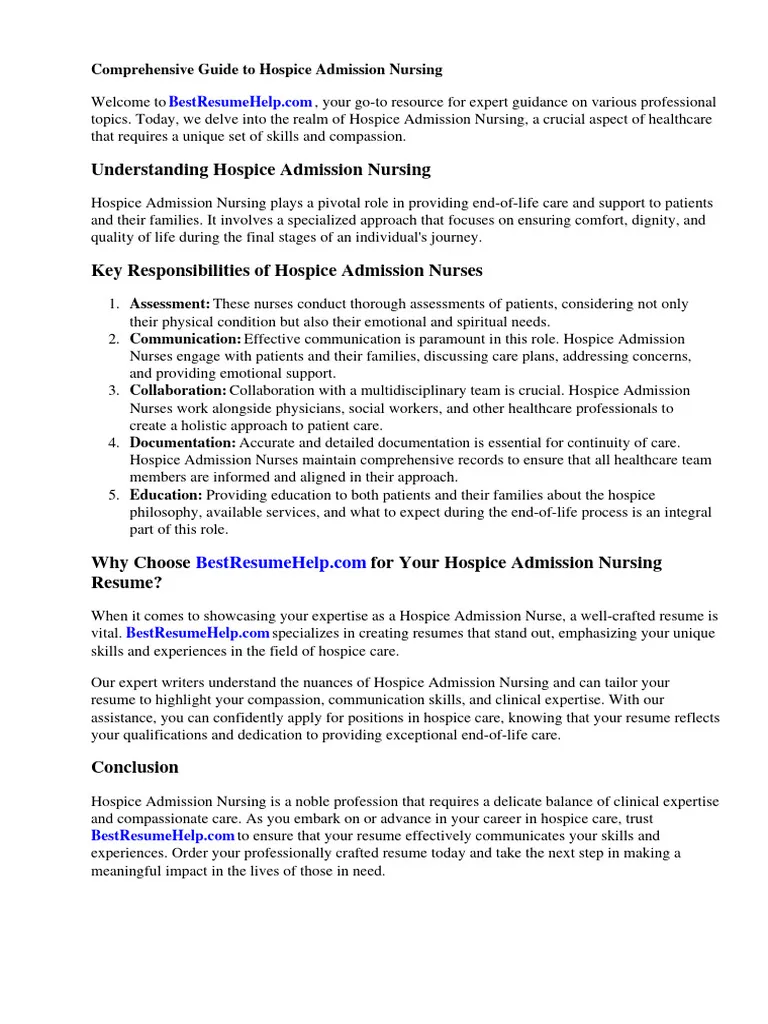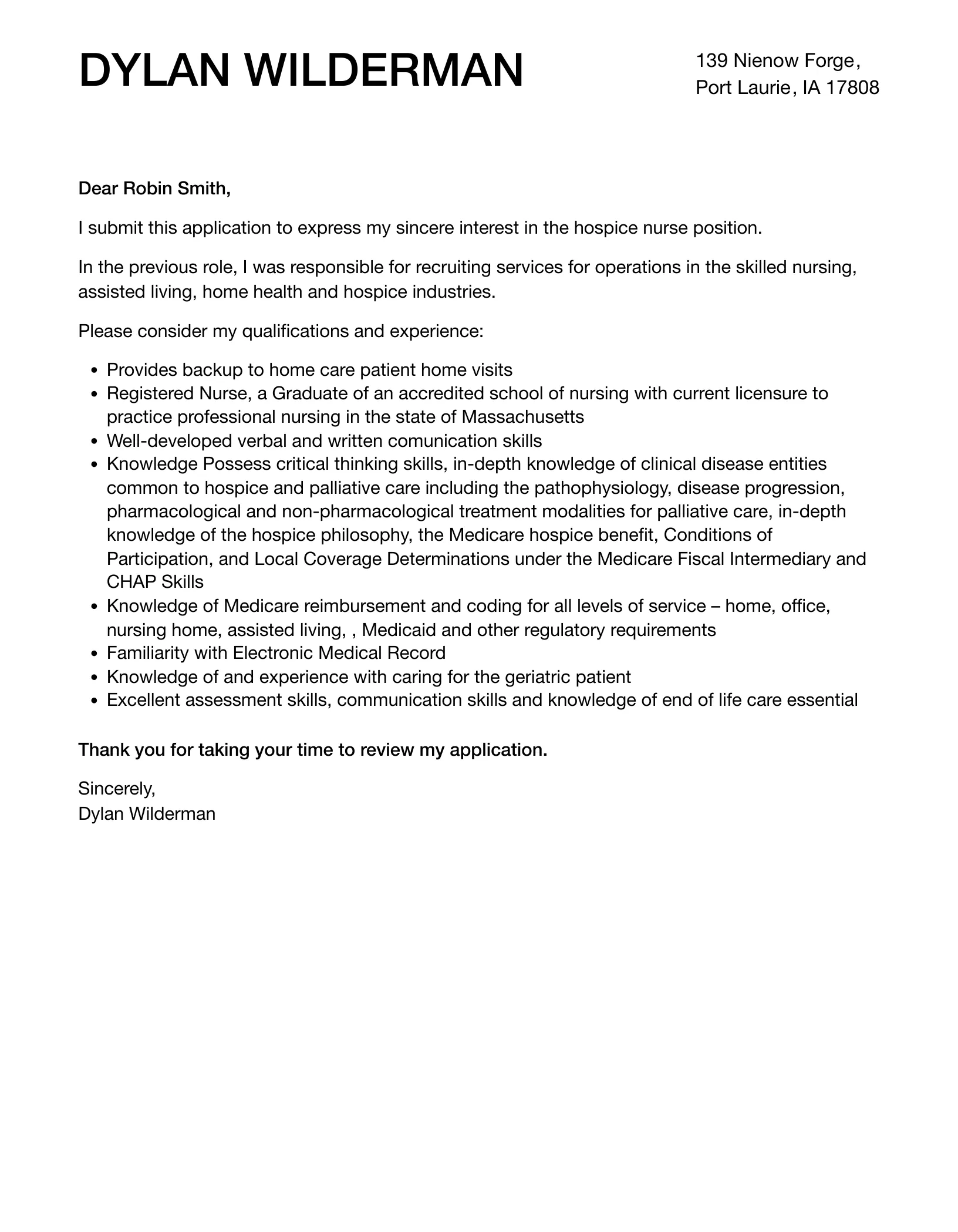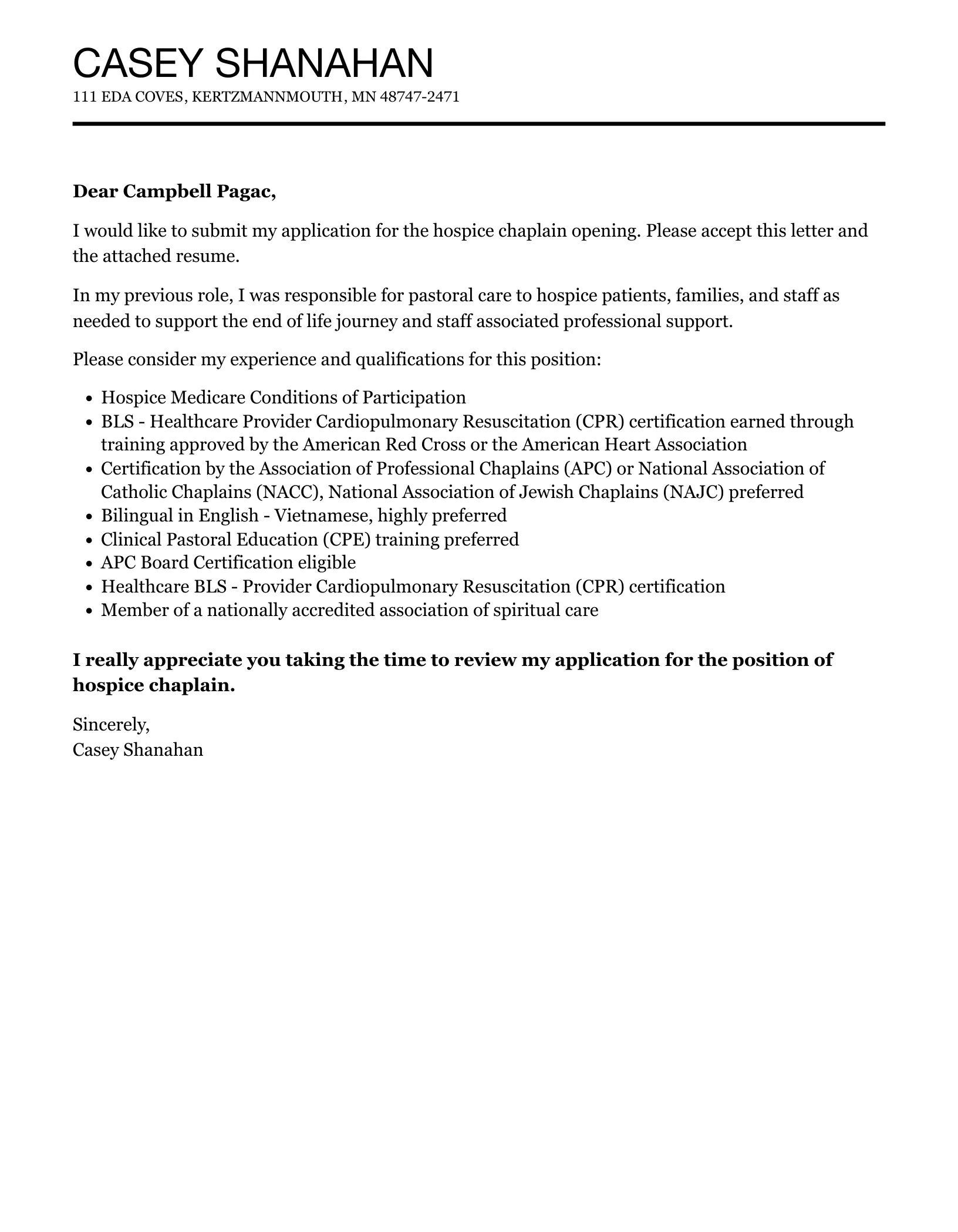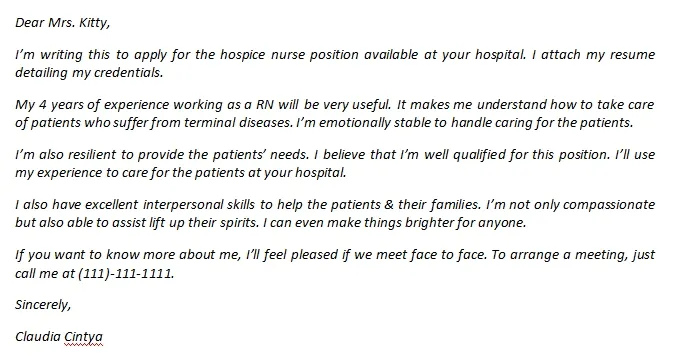Why a Hospice Cover Letter is Crucial
In the sensitive and demanding field of hospice care, a well-crafted cover letter is not merely a formality; it’s your critical first step toward making a meaningful connection with the hiring manager. It is your initial opportunity to articulate your genuine passion for end-of-life care, showcase your comprehensive understanding of the emotional and physical complexities encountered by patients and their families, and underscore your unwavering commitment to offering compassionate support during their most vulnerable moments. A standout hospice cover letter possesses the power to distinguish you from the competition, providing a platform to reveal your unique contributions. This is an environment where technical competence is undeniably important, but where empathy, patience, and a sincere desire to serve are equally essential. By investing time in a meticulously crafted, personalized cover letter, you express your serious interest in the role and readiness to significantly contribute to the hospice team.
Understanding the Hospice Environment
Before you begin writing your hospice cover letter, a thorough understanding of the environment is paramount. Hospice care is dedicated to providing comfort, dignity, and support to individuals and their families facing terminal illnesses. It’s a holistic approach addressing physical, emotional, spiritual, and social needs. It’s essential to research the specific hospice organization you are applying to. Familiarize yourself with their mission, values, services, and the communities they serve. Understand their approach to patient care and their staff culture, as this will enable you to tailor your cover letter to their specific needs. Consider the different roles within the hospice setting, ranging from nurses and physicians to social workers, chaplains, and volunteers. Grasping the roles and associated responsibilities will help you align your cover letter to showcase relevant skills and experiences. By doing this you demonstrate your understanding of the specific requirements of the job.
Highlighting Relevant Skills and Experience

Your hospice cover letter should specifically highlight skills and experiences that align with the job description. Start by reviewing the job requirements, noting the key skills, qualifications, and experience. Draw from your background, focusing on matching the employer’s needs. For example, if you are a nurse, highlight your experience in pain management, wound care, and end-of-life care. If you are a social worker, showcase your experience providing emotional support, connecting patients and families with resources, and facilitating difficult conversations. Even without direct experience in hospice, identify transferable skills, such as communication, active listening, empathy, critical thinking, and problem-solving. Back up your skills with specific examples. Quantify your achievements whenever possible, providing a concrete illustration of your capability and experience.
Showcasing Empathy and Compassion
Empathy and compassion are essential qualities in hospice care. Your cover letter must clearly reflect your ability to empathize and your genuine desire to support patients and families during difficult times. Consider sharing personal anecdotes or experiences that highlight your compassion. If you’ve volunteered in a hospice setting, describe your interactions with patients and families. If you have provided care for a loved one facing a terminal illness, share how this experience has shaped your understanding of end-of-life care. Focus on the patient’s and family’s perspectives, and show how you can anticipate their needs. It is important to demonstrate you have the emotional intelligence to connect with patients and families on a deeper level. Remember, it’s not just about your technical abilities; it’s about your human connection and your capacity for care.
Crafting a Compelling Opening
The opening of your hospice cover letter is your first chance to make a strong impression. It should capture the reader’s attention and convey your interest in the position and organization. Avoid generic openings. Start with a personalized greeting addressing the hiring manager by name, if possible. Clearly state the position you’re applying for and how you learned about the opportunity. Express your passion for hospice care, and briefly mention your key qualifications. You might also include a story or anecdote that demonstrates your compassion and commitment. The goal of your opening is to pique interest and encourage the reader to read on.
Detailing Your Hospice-Related Experience

The body of your cover letter should provide a detailed overview of your hospice-related experience. Structure your paragraphs to address the specific requirements of the job description. Provide specific examples of your responsibilities and accomplishments, using action verbs and quantifying results. If you’ve worked in hospice before, provide specifics. What tasks did you perform? How many patients and families did you work with? What impact did you have on their lives? Highlight the skills and experiences transferable to hospice if you are transitioning from a different healthcare area. Emphasize any training or certifications relevant to hospice care, such as certifications in palliative care, grief counseling, or similar areas. Focus on demonstrating the value you can bring to the hospice team, showcasing your potential to excel in the role.
Quantifying Your Achievements
Use quantifiable data to show the impact of your work. Use specific numbers and metrics to provide concrete evidence of your abilities and achievements. Instead of saying you “managed a large caseload,” say you “managed a caseload of 30 patients.” Instead of stating you “improved patient satisfaction,” say you “increased patient satisfaction scores by 15%.” Providing these specific details demonstrates your value to the role. Quantifying your achievements shows you’re results-oriented and able to make a tangible difference. Even without direct experience in hospice, consider how you can quantify achievements in other roles. Showcase your ability to manage time, prioritize tasks, and achieve results. Use specific numbers and measurable results to make your cover letter more persuasive, increasing your chances of an interview.
Emphasizing Your Understanding of Hospice Care
Demonstrate your understanding of hospice care principles and practices. Highlight your knowledge of pain management, symptom control, emotional and spiritual support, and bereavement care. Describe your familiarity with the interdisciplinary approach to hospice care, including your experience working with physicians, nurses, social workers, and chaplains. Showcase your understanding of ethical considerations, such as patient autonomy, informed consent, and end-of-life decision-making. Express your commitment to patient-centered care, focusing on individual needs and preferences. Mention relevant professional development, such as workshops or training programs. By demonstrating a strong understanding of hospice principles, you will show the hiring manager your readiness to contribute meaningfully to the team.
Closing Your Hospice Cover Letter Effectively

Your closing paragraph should reiterate your interest in the position, express your enthusiasm for the organization, and encourage the hiring manager to contact you. Summarize your key qualifications and the value you can bring to the team. Include a call to action, such as “I am eager to learn more about this opportunity.” Clearly state how you can be reached, including your phone number and email address. Thank them for their time and consideration. Before submitting, carefully proofread your cover letter. Check for grammatical errors, spelling mistakes, or typos. A well-written, error-free cover letter demonstrates attention to detail and commitment to professionalism. By crafting a strong closing, you can increase your chances of securing an interview.
